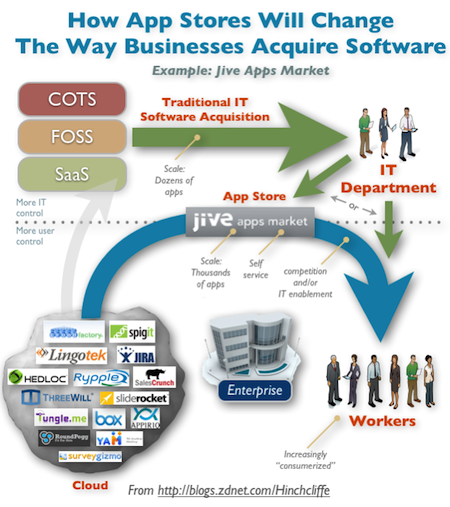Jive seeks to up IT's game with social apps

The perception is growing that app stores provide a convenient, safe, controlled, and sensible distribution model that can be managed and governed. With the seeming prevalence in everyday life of cloud apps, mobile apps, and social networking, today's worker is becoming quite accustomed to a highly usable, better integrated, and more deeply connected way of life. Simply put, workers now expect the richness, power, and variety they see in their personal IT to be available at work too.
Often referred to as the consumerization of IT, it's a broad movement that many in the industry are watching closely. It's also the premise of a growing number of enterprise software solutions that aims to bring the ease-of-use and radical simplicity of today's Web and consumer devices to the business world. As a particularly interesting example, I've been tracking Jive Software and their plans for capitalizing on this trend by adding a full-blown app store to the latest incarnation of their social business platform, the recently released Jive 5.
Based on what I'm seeing, many indications point to app stores like Jive's becoming a common phenomenon in enterprise software, at least at the offering level. Of course, though there will be the inevitable proliferation of products and just as unavoidable shake-out like always in the technology business, the writing increasingly seems to be on the wall: The consumer world is in the process rewriting the entire way that businesses -- and more specifically their workers -- find, research, pay for, and use the software they need.
As I covered here over the years, there is a long tail of pent-up demand in business software that several times larger than the typical enterprise application backlog. Smaller, more targeted solutions, especially at a departmental level, have little place in the traditional IT procurement process which usually involves security audits, enterprise architecture reviews, vendor analysis, compliance and regulatory checks, and so on. It's just too expensive and heavyweight. Never mind the build vs. buy process, which makes even less sense for a broad swath of software.
Related: App Stores - The New Must-Have Digital Business Model.
Increasingly, as the consumerization trend takes hold, users are just taking things into their own hands (up to 30% of all IT at this point) and obtaining the software they need from the cloud or their mobile devices. Further complicating the situation is that more and more applications are also adding social media features of their own. This exacerbates today's IT landscape by fragmenting key aspects of internal social media, from identity and user profiles to activity streams.
Enterprise App Stores: Self-Service Software Acquisition
Enter Jive's new Apps Market, which resides prominently within their new social business platform and aims to be the focus of worker activity, not only their collaborative processes but also any related applications and information they use along the way. Launched officially last week, Jive's Apps Market currently has a starter set of partner providers that have provisioned their cloud apps for the store. The advantages of doing having apps embedded in the social experience are many. I've taken at a look at these in detail from a social networking integration perspective as well as a technical view recently with an examination of recent advances in OpenSocial, the increasingly popular social app standard that Jive has selected for apps in their ecosystem to use.
The bottom line is that enterprise app stores have the potential to enable real self-service, greatly increase access to new IT to solve long-standing business challenges, and create much needed competition inside of organizations for the best solutions to local issues. These are just a few of the benefits, though there are always challenges to new ways of doing things, including outright resistance from IT.
Success = Partner with both IT and the Business?
Fortunately, I've found that Jive's approach is very much one of partnership with both business users and IT. To get first hand perspective on what makes Jive's Apps Market approach special in this regard, I spoke late last week with Chris Morace, head of Jive's partner ecosystem strategy, about their new app store.
The approach is taking is one of helping IT move out of keeping the systems running and being in the business of providing real solutions to problems:
We're asking, can the enterprise shake off its dustier roots? Can consumer simplicity be brought in and have the security and power that the enterprise requires? The enterprise is under siege today and the pace of change in technology has continued to increase. Instead of being strategic to the business, IT spend 70% of the time keeping the lights on while the business side is frustrated. There's a lot of tension there while waves of disruption keep coming: Social, mobile, and cloud all coming at the same time.
It's harder than ever for IT to keep the wheels on the bus. Everybody is weaving social features in and around their platform. CIOs are looking up and seeing pools of social around everything. None of it is talking to each other. Businesses expect it all to works. They don't want to create 20 different to profiles and keep information in 40 different places. Ironically, systems designed to connect people together are preventing people from talking. A solution to integration should have software automatically work seamlessly with a social layer.
In this way, Jive views itself as an enabler of IT. We want them to be a hero again. We think we can enable a dialogue between employees, the business and IT. Jive wants to provide access to innovation in the cloud. Though cloud tool companies are still in the early stages sometimes and don't understand all the things the enterprise needs to have and we can help. We also know not everyone will jump on board. Some customers will only use the app store for their own apps. Over time we'll believe we'll see more and more enterprises relax their policies [around where apps come from.]
I asked Chris what, if anything, Jive was doing to get this message to IT departments, which are in the position to outright block app stores if they think they are inappropriate. His answer was:
Candidly, we're reaching out and having a lot of good conversations. We've neen proactive about getting early adopters and showing them the app store. We've showed a lot of early features and administration. Do they want white list vs. black list, etc. [which has come out in the final product.] Just as importantly, we want to hear what our employees want to use. We don't want users think we're just blacklisting everything.
Noting that App Market is going to just be one of many enterprise app stores hitting the market in the next year, I asked what his thoughts were on that:
People can get confused by all the news [about app stores.] Clearly some of these patterns in consumer app stores should be emulated. App store technology has to be dead simple to use as well as easy to integrate into the social layer. For example, OpenSocial uses popular and standardized models and has worked very well for us. Another strength for Jive Apps Market is that commerce models are well thought out. Users can use invoices [which companies are more familiar with] or credit cards. We make it as frictionless as possible, yet there are still controls for administrators and IT.
Related: Reconciling the Enterprise IT Portfolio with Social Media.
In reality, it's early days yet and there are no market leaders in enterprise app stores, unlike the consumer space where Apple's App Store currently rules. Many app stores are assuming that IT departments are going to be the big obstacle in the cloud computing era and are aiming directly at the SMB space. This includes much of Google's and IBM's strategy currently, though this is changing as the perception is growing that app stores provide a convenient, safe, controlled, and sensible distribution model that can be managed and governed.
Instead, what Jive Apps Market does, by doing an inside-out approach to app stores (apps run contextually within the social network, instead of on their own), is provide a unique approach that takes smart advantage of the twin hot button trends of IT today, social and cloud, to provide a significant new approach to application integration, user productivity, and a new way to manage the IT software portfolio. The question is whether the market will agree. I'm planning to revisit how the Apps Market is doing at some point next year to see how it's doing.
Is your organization thinking about app stores yet? Why or why not?
